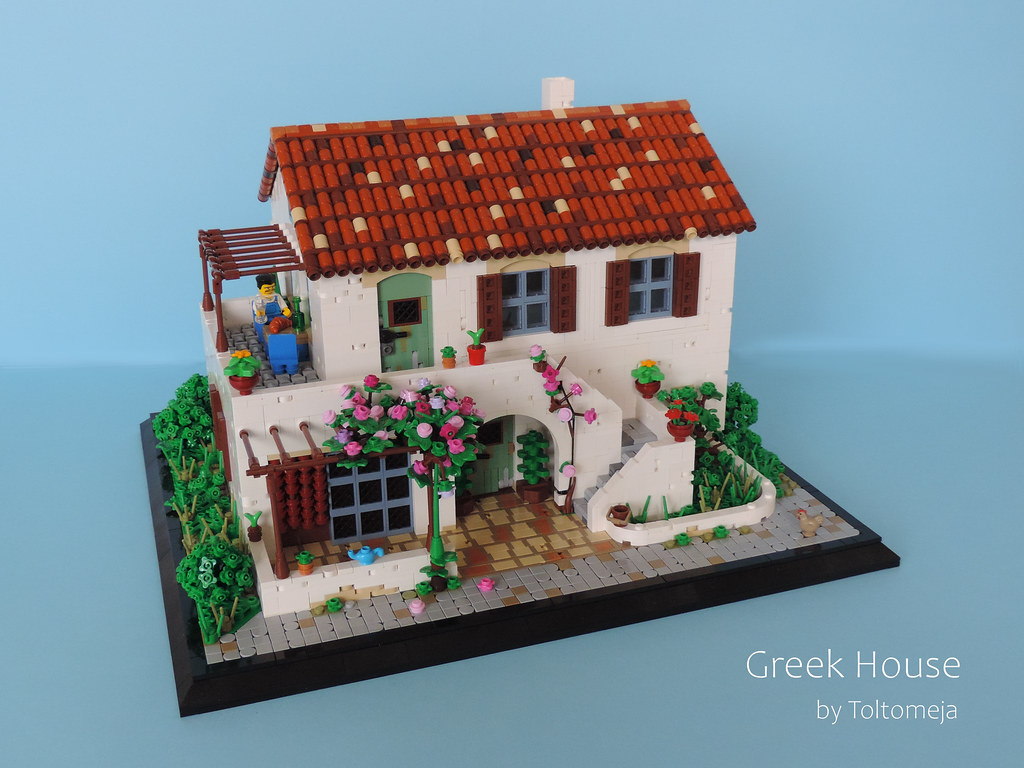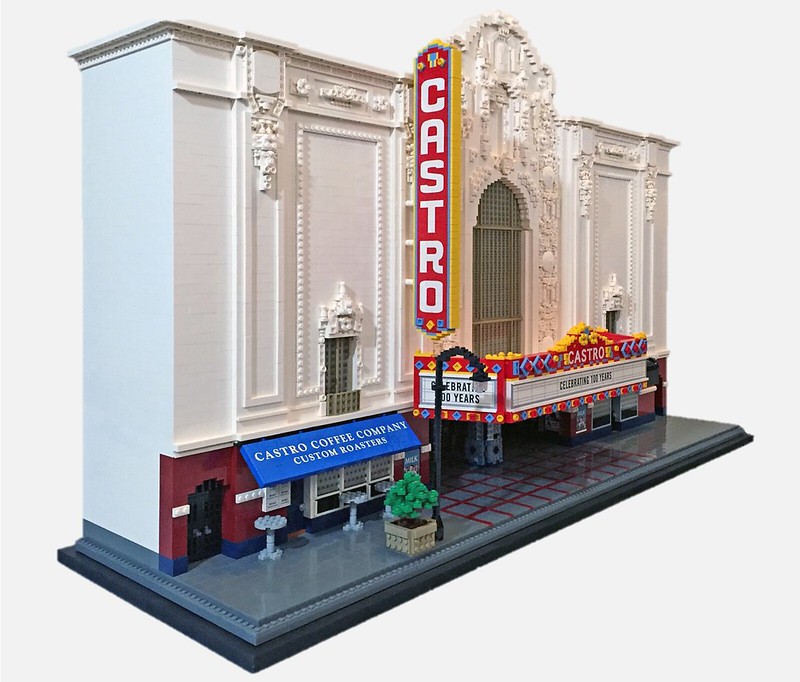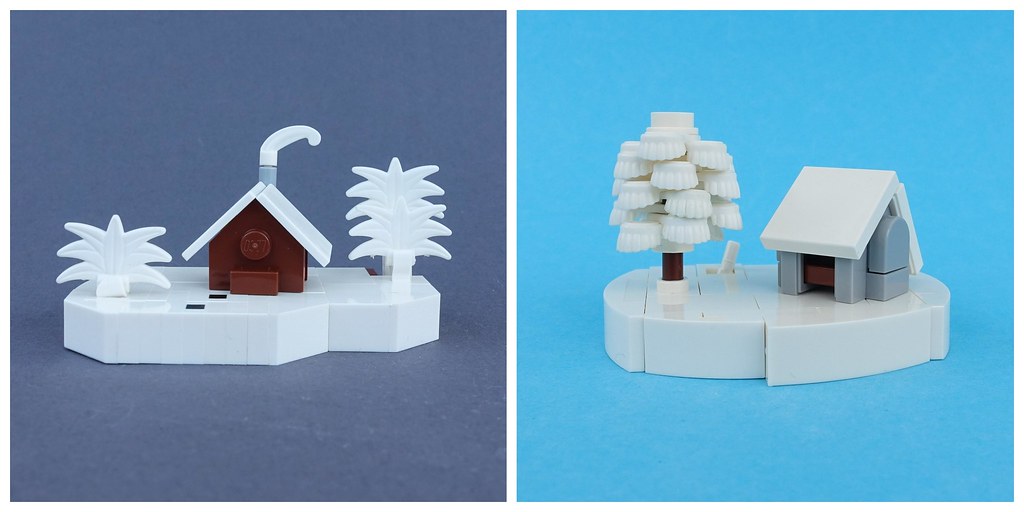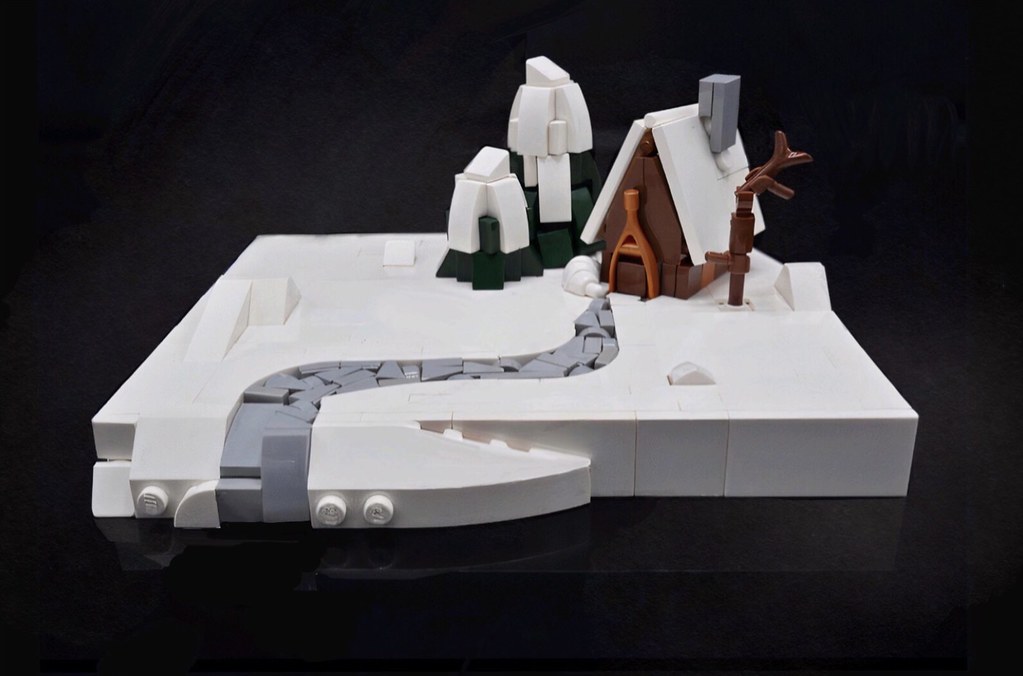I had to look really good to see that this model by Tong Xin Jun is built and rendered digitally. The fact that only existing colors were used certainly helped fool the eye. This cute little house is complete. It comes with its own vineyard and wine cellar, and what more could a person ask for during a pandemic? The brick build base makes this model look very polished. Creating a difference in texture between the path towards the house and the lawn adds to the feeling that the lawn is filled with autumn leaves. And have you seen those roof dormers? The best thing about this house is that it is fully furnished from the basement to the attic. And the furniture wasn’t an afterthought. It is designed beautifully. Sometimes a fan of LEGO uses a part in a way it was not designed for, but it just makes sense. The round 2×2 tile with wood grain pattern used as a cutting board/charcuterie plank is an example of this.
Tag Archives: Architecture
Rapunzel, Rapunzel, let down your…long chain of bricks
A classic fairy tale gets the LEGO treatment with this towering six foot tall brick-built minifigure-scale structure created by Martin Harris and inspired by the Disney film Tangled. Not only do we get the famous tower in this work, we also get a nice landscape – the forest in which Rapunzel was tucked away, complete with colorful trees and a nice riverbed utilizing many nature-inspired elements including flower pieces, plants, and tree-limb elements in varying colors.
A peaceful house in the Greek countryside
Γεια! — That’s “hello” in Greek, which is what I would say if I were visiting this Greek house in person. Built by creator Toltomeja, the Greek House is a fantastic portrayal of typical dwellings in Greece.

My favorite part about the house is the white walls and stairwells. It’s such a classical look. The tile flooring on the patio is very well done. I appreciate the variety of colors used to indicate foot traffic over the years. An additional sign of the house’s age is the vine work growing up the side of the stairs.
This was a gorgeous LEGO model to look at. If it was a submission on LEGO ideas, I would definitely throw in my support!
A corner shop to rid all builder’s block
With the closure of shops and buildings, it’s been difficult for some builders to find their architectural inspiration. However, some have found ways to avoid that awful builder’s block. Drawing from both imagination and inspiration from Google Maps’ street view of Amsterdam, Thomas van Urk (aka Utanapishtim, aka Thomassio) has created yet another marvelous city modular. As always, this corner building looks incredibly clean and packed with architectural detail. Its dark tan facade is textured with masonry bricks, with a good balance of light gray bullions in its trim. The symmetry in the building overall is also incredibly satisfying to look at, not to mention the beautiful accented dark red windows at the front.
Like this builder’s style? Take a look at Thomas van Urk’s Fright Knights tribute, which I assure, you will find frighteningly amazing.
Ariandel inspired microscale church
I really enjoy it when a builder thinks outside the box. Nathan Hake shows us that he is very capable of doing so. For his micro-scale LEGO church, he used wheel cover with y shaped spikes for the main round window in the church tower. There are ice scates on the roof and the entrance is a plate with tooth which is brilliant in its simplicity. My guess is that this church is gothic inspired because it matches the 5 key architectural elements: large stained glass windows, pointed arches, ribbed vaults, flying buttresses, and ornate decoration. The ribbed vaults are a bit hard to spot from the outside, but we can all imagine them there, right?
A good ol’ apartment building in Theed, Naboo
I think it’s safe to say that many fans’ fascination with Star Wars revolves around the universe itself with its interesting planets offering eye-catching landscapes and architecture. Anthony’s LEGO model of an apartment dwelling on Naboo, while not an exact building from the films, reimagines the aesthetic of Naboo’s capital city, Theed and projects it onto an everyday building.
This model certainly is referential to modular type builds, but two features really hone in on the Star Wars vibe. The obvious one being the clone trooper minifigures on patrol, and the other – the sand green dome which is a signature element of Naboo’s architecture. The dome is definitely my favorite part of this build, comprised of two sand green dish pieces laid on top of a square base made with sand green slopes, tiles, and bricks. The rest of the structure is quite standard; composed of bricks, slopes, and tiles as well as some more ornamental elements which can be seen in the archways, windows, and balcony. Quite honestly Anthony’s modular could fit into a larger brick-built Naboo cityscape or just as well a regular LEGO city, its specificity as well as its versatility is much appreciated.
Cooking up something special with bananas
The LEGO banana element is not necessarily the most useful piece, right? It has only one connection point, at one end, and no matter what you do with it, it still looks like a banana. That has not stopped LEGO from using it all over the place, whether that be gold bananas in Ninjago sets, grey ones in Mixels, or white, teal, and dark blue from various Chinese festival sets; but it still looks like a banana. But when I was taking my almost-two-year-old to the bathroom the other day, I realized that the handles on the faucet looked remarkably banana-like, with the same curve and general shape. So that got me thinking: could I make a kitchen that used a banana sink? In my own collection, I have only yellow and gold bananas, so it had to be a gold sink, but brass is coming back in, right? Or was it in, and now it’s back out again?
The rest of the kitchen came together around the sink, scaled to that. It’s loosely based off of the kitchens from my last two houses in layout, though the dishwasher should be to the right of the sink for better accuracy. It ended up using almost all my dark brown tiles and bricks and plates (as well as slopes!) for the cabinets, so I’m glad I did not go bigger, and if you look closely at the sand green walls, you’ll see that they are largely made of 1×2 plates. I am not looking forward to taking this one apart. The ceiling came last, but I knew I needed one, since I wanted an immersive shot, and those always look more convincing with the ceiling and a controlled light source. So I made it studded, to replicate the horrible textured ceilings that so many houses have (including my own), and made the light for the photograph come through the ceiling fixture, with a little reflecting in from the window and the banana moon (which would have been better in white, admittedly). I’m fairly pleased with the build, though I do think the floor is ugly, and so does my wife, but that’s the tiles I had in abundance, so that’s what I used. Maybe we’ll remodel it someday.
If you like this build, you’ll probably like this collection of LEGO kitchen builds. And don’t forget to tune in to the Iron Forge competition, where the banana is the seed part.
Castro Theatre, the heart of Eureka Valley
One of my favorite things about San Francisco is its architecture. Though shops have closed and the streets are nearly empty, some of the city’s most vibrant buildings still stand. Just off Market Street, you’ll find the Castro Theatre, whose majesty has been translated into LEGO by Jonathan Lopes. Since 1922, the Castro Theatre has hosted everything from queer cinema to silent film festivals at the center of San Francisco’s vibrant arts scene and historic LGBTQ+ district. Like in Jonathan’s model, you can’t miss its iconic neon signage and stunning Spanish-Baroque facade.
Click here for an in-depth look at the Castro Theatre!
There’s a house on my street, and it looks real neat
There are times when a LEGO fan starts building, gets into the groove of things, then finds it hard to stop. Especially when the build is a small street that keeps growing with each mini modular building placed on it. When I (Mansur “Waffles” Soeleman) attended my LUG‘s (LondonAFOLs) monthly meet-up via Zoom, the theme was mini modular buildings. Every year since 2007, LEGO released a large modular building, each of which can be arranged into a street layout. As a fifth anniversary to the lineup, LEGO created a microscale version of the first few buildings. I started to build a micro modular for the meet-up, and then I couldn’t help but build more. A few days after the meet-up, I ended up with a whole street.
Click to see each micro modular building in detail, along with the build process!
Today’s tiny houses, LEGO edition
I’ve always admired the tiny-house movement and its adherents; it’s always wonderful seeing these little homes while out on a drive. Therefore, unsurprisingly I am also delighted to see minimal LEGO houses often done as mini-builds or in microscale. Patrick’s tiny LEGO house certainly takes LEGO minimalism to the next scale!
In order to execute this build, Patrick uses a combination of vintage and new elements as well as a mix of unique and common pieces. The snowy ground the house rests on is comprised of a few white 1×1 bricks, slopes, and plates arranged by way of the SNOT (studs not on top) technique. The body of the home mainly makes use of the 2×2 pentagonal plate – a very interesting and not so common piece. Two types of feather pieces are utilized here – the single feather which renders smoke coming from the chimney and the plume feathered headdress which Patrick uses as snow-covered trees. In another build featured below, similar use of old and new, common and unique, is also used.
It’s a cat-love-dog world?
In our current apocalyptical-like times, I’m sure most of us could use some feel-good imagery or stories in our lives. Here’s a sweet little LEGO vignette by Sebastian Arts, involving an amicable relationship between natural enemies – a cat and dog.
The main portion of the build is a fractured architectural setting with a post-apocalyptical feel to it. The drab grey color-scheme is made interesting by the sharp forms Sebastian shapes using mostly plates, slopes, tiles, and even blades. Some rounder elements are also incorporated, including 1×1 cylinders, 2×2 ridged cylinders, 1×1 cones, rounded sticks, and my favorite piece here – the technic bearing plate which is utilized in multiples to create a small roof. The focal point of the model is definitely the red 3×3 heart plate with a red 2×2 circular tile suspended over the orange striped cat and grey and white husky dog, all of which add a splash of color within the monochrome built environment. What can I say? This model just warms the heart but is also aesthetically quite pleasing.
A Quaint Season’s Greetings Scene
Winter is here, and I’m sure many folks are transitioning from holiday cheer to some peace and quiet. This little A-Frame micro-scale build by KitKat1414 certainly embodies the more quiet nature of early January.
Although this model is on the smaller side, there is so much to love. The base is built using the SNOT (studs not on top) technique, while the cobblestone pathway leading to the small home utilizes slopes and tiles placed on their sides, not making connections to studs. The use of the crutch element as a doorway is particularly clever, and I also enjoy the croissant piece in white used to render snow. The little builds comprising snow-covered evergreens and the brown leafless tree add the perfect winter touch to this mostly snowy white build. This model certainly feels a lot like winter.












